Variables can be used in the text of mailings, on website pages and in widgets.
Variables are entities that will be replaced with individual user data.
There are three types of objects on the platform:
Each user/order/purchase will have its own variable value. In other words, with the help of variables in the letter or on the page of the website, data are indicated that are relevant specifically for the user who sees the message.
Variables on the “Users” object

Variables for the «Users» object
| {uid} | User ID |
| {account_title} | Account title |
| {account_logo} | Account login |
| {account_login_address} | Account login address |
| {account_name} | Account name (in English) |
| {mail_text_html_link} | Link to html version of the letter |
| {first_name} | User first name |
| {real_name} | Username in correct Russian spelling |
| {last_name} | User last name |
| {email} | User email |
| {phone} | User's phone number |
| {unsubscribe_link} | Unsubscribe link |
| {participant_code} | Partner code |
| {personal_manager} | Personal manager name |
| {personal_manager_email} | Personal manager Email |
| {personal_manager_phone} | Personal manager phone number |
| {user_hash} | User verification code |
| {created_at} | Registration date (details) |
| {name} | Full name |
| {avatar_url} | Avatar URL |
| {today} | Current date (details) |
| {balance_virtual} | Virtual balance |
| {balance_deposit} | Deposit balance |
| {unsubscribed_at} | Unsubscription date (details) |
| {lesson_answer_count} | Number of answers to lessons |
| {lesson_answer_count_str} | Number of answers to lessons (text) |
| {active_sale_code_NNN} | Purchased promo code of the promotion event (details) |
| {today plus="N"} | Current date + N days (details) |
| {nextweekday day="monday" today="yes/no"} | Date of the next day of the week (details) |
| {city} | User city (in processes only) |
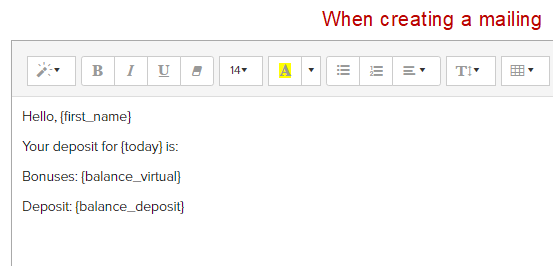

Please note: for correct operation of the variables for the user personal manager - {personal_manager}, {personal_manager_email} and {personal_manager_phone} — the «Sender’s name», «E-mail address from which letters are sent to clients» and «Additional phone number» must be indicated in the «Partner program» section:
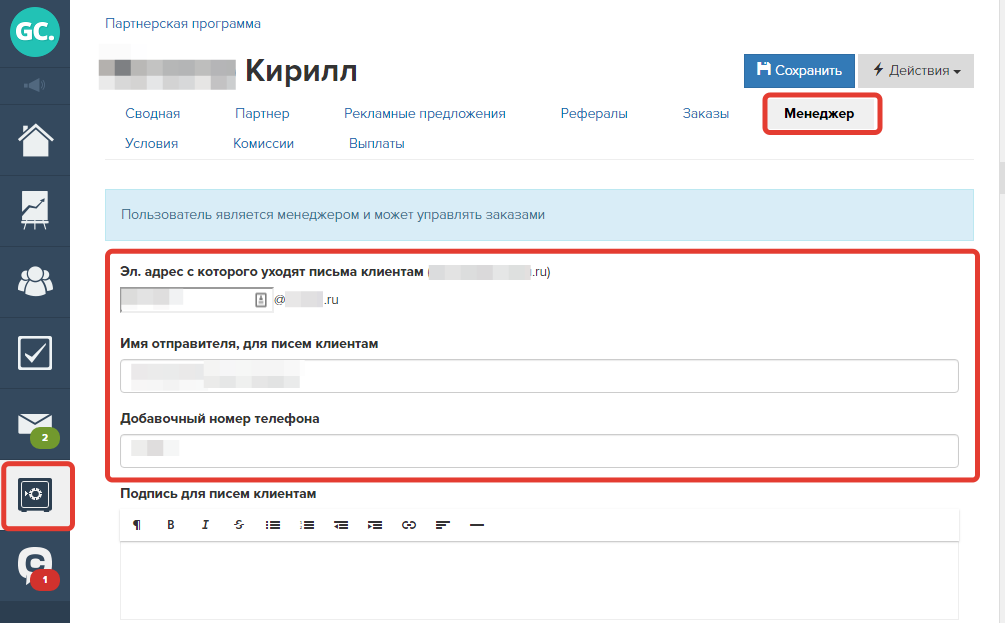
You can also use data from the additional user field, for this you need to enter the title of the additional field into the variable:
• {Additional_field_name}
You can also use a variable in your mailing list for instant order confirmation.
There is also a separate variable that indicates the number of users in a particular group:
• {calc_group_count_ID} — indicates the number of users in the group. The ID must be replaced with the digital ID of this group (you can copy it from the link to the group).
• {calc_group_count_ID word1="student" word2="student" word5="students"} — indicates the number of users in the group and adds a suffix — text that depends on the number:
word1 — if the number ends with 1.
word2 — if the number ends with 2, 3, 4.
word5 — if the number ends with 5, 6, 7, 8, 0.
If a space is needed between the number and the suffix, then the space must be added to the suffix.


On website pages it is also possible to use the {query.prmName | defaultValue} variable.
Using this variable, you can substitute parameter values from a link.
For example, in different versions of advertisements targeting different audiences, the link may contain different parameters: utm_keyword=retirees or utm_keyword=women on maternity leave, etc. Then the user will be able to go from the advertisement to the page already adapted to his search query. That is, the text on the page and the ad text will match, which will lead to an increase in target audience interest and conversion.
prmName — the value of the parameter that is passed from the link;
defaultValue — the default value that will be used if the specified parameter is absent in the link.
If the variable is used like this — {query.prmName}, then the default value will be considered empty.
For example, in the link you can specify the parameter keyword=retirees or keyword=women on maternity leave:
{your_account_name}.getcourse.ru/?keyword=retirees
Indicating the variable on the page in the text and replacing the variables:
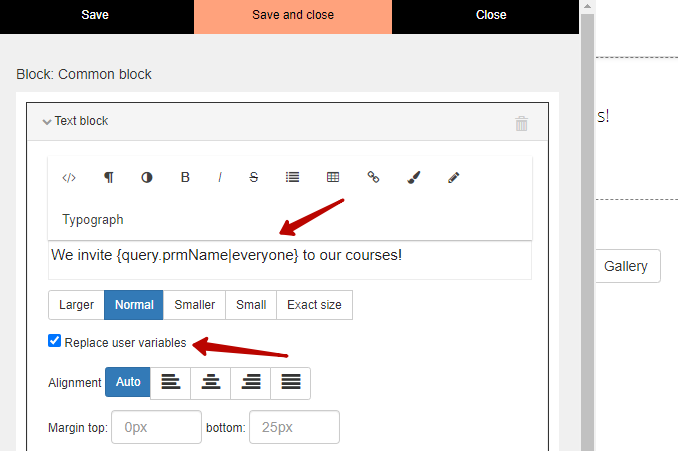
We follow the link and see the display of the parameter in the text:
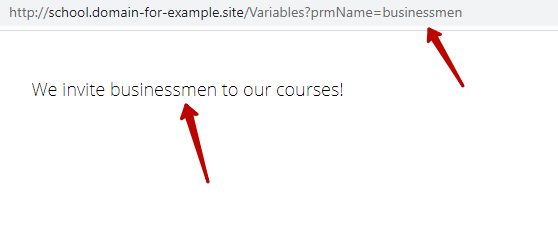
If the parameter is not specified in the link, then we see the default value (defaultValue = everyone):

Variables for the «Orders» object
| {uid} | User ID |
| {account_title} | Account title |
| {account_logo} | Account logo |
| {account_login_address} | Account login address |
| {account_name} | Account name (in English) |
| {mail_text_html_link} | Link to the html version of the letter |
| {first_name} | Username |
| {real_name} | Username in correct Russian spelling |
| {last_name} | User last name |
| {email} | User email |
| {phone} | User phone number |
| {unsubscribe_link} | Unsubscribe link |
| {participant_code} | Partner code |
| {personal_manager} | Personal manager name |
| {personal_manager_email} | Personal manager Email |
| {personal_manager_phone} | Personal manager phone number |
| {user_hash} | User verification code |
| {created_at} | Registration date (details) |
| {today} | Current date (more details) |
| {id} | Order ID |
| {number} | Order number |
| {positions} | Order contents |
| {cost_money} | Order cost |
| {cost_money_value} | Order cost without specifying currency (only in processes) |
| {left_cost_money} | Remaining payment |
| {payed_money} | Amount paid |
| {status} | Status |
| {payment_link} | Link to payment |
| {promocode} | Name of the promo code used in the order (only in processes) |
| {deal.created_at} | Order creation date (only for mailings) (details) |
| {deal.payed_at} | Order payment date (only for mailings) (details) |
| {deal.created_at_datetime} | Date and time of order creation (only for mailings) (details) |
| {deal.payed_at_datetime} | Date and time of order payment (only for mailings) (details) |
| {active_sale_code_NNN} | Purchased promo code of the promotion event (details) |
| {offers} | Order contents: ID-identifiers of offers (in processes only) |
| {vk_id} | Order owner ID |
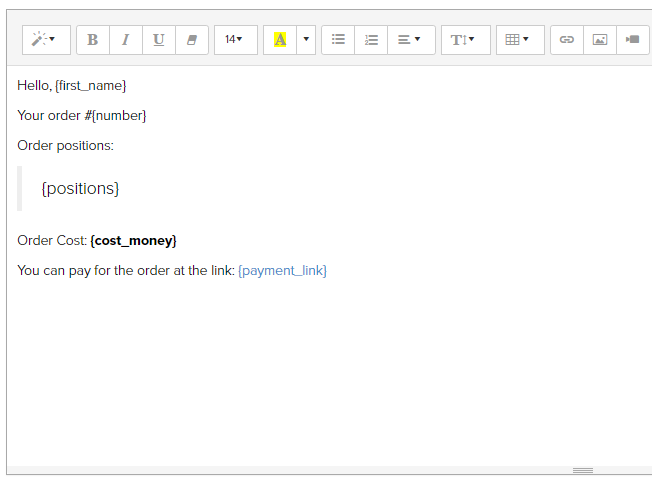
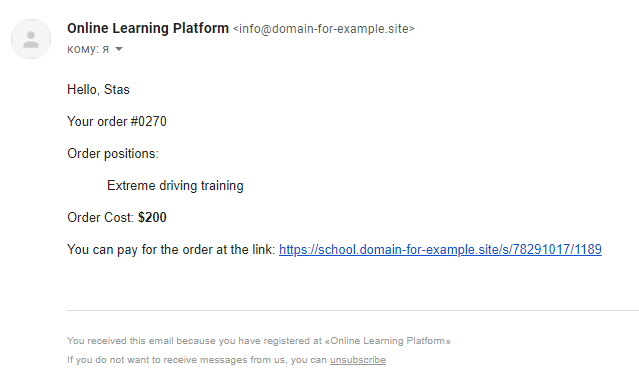
You can also use data from the additional order field, for this you need to enter the title of the additional order field in the variable:
• {Additional_order_field_name}
Variables for the «Purchase» object
| {uid} | User ID |
| {account_title} | Account title |
| {account_logo} | Account logo |
| {account_login_address} | Account login address |
| {account_name} | Account name (in English) |
| {mail_text_html_link} | Link to the html version of the letter |
| {first_name} | Username |
| {real_name} | Username in correct Russian spelling |
| {last_name} | User last name |
| {email} | User email |
| {phone} | User phone number |
| {unsubscribe_link} | Unsubscribe link |
| {participant_code} | Partner code |
| {personal_manager} | Personal manager name |
| {personal_manager_email} | Personal manager Email |
| {personal_manager_phone} | Personal manager phone number |
| {user_hash} | User verification code |
| {created_at} | Registration date (details) |
| {today} | Current date (more detail) |
| {product_title} | Product name |
| {start_at} | Start date (details) |
| {finish_at} | End date (details) |
| {start_at_ago} | Time from start |
| {finish_at_ago} | Finish time |
| {period_string} | Access period (details) |
| {state} | Current state of purchase |
| {link} | Purchase link |
| {training_link} | Training link (if the product is related to training) |
| {training_title} | Training title |
| {training_teacher_full_name} | Full name of the main teacher of the training |
| {training_teacher_avatar_src} | The path to the teacher’s avatar file |
| {sale_code} | Promo code that gives the user a purchase (if the product type is a promo code) |
| {vk_id} | ID of the user linked with the purchase |


Attention!
Only «variables for users» can be used on pages and in widgets.
In order for a variable to be converted to a value on the website page, it is necessary to check the «Replace user variables» checkbox in the block settings.
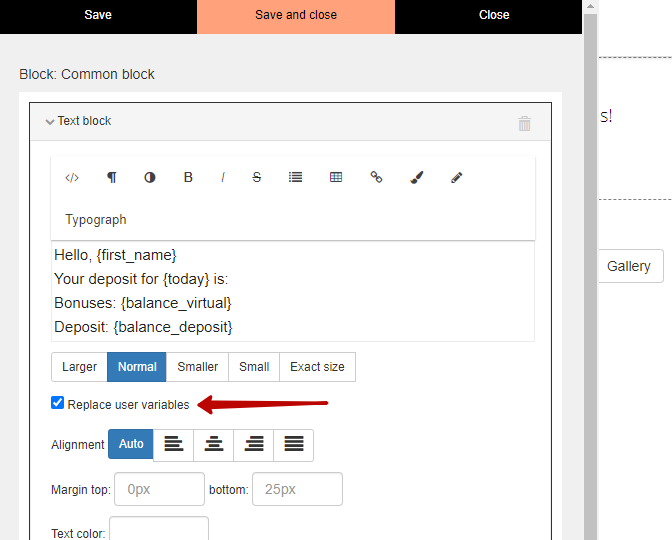
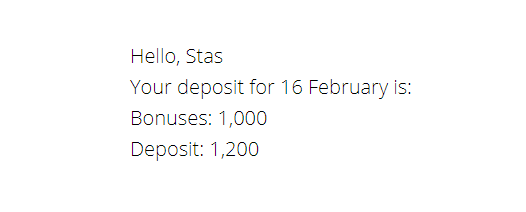
You can also create your own variables on the platform and use them in mailings, widgets and on website pages.
If you want to use variables in a process, then take a look at the article «How to use variables in a process correctly?»
We use technology such as cookies on our website to personalize content and ads, provide media features, and analyze our traffic. By using the GetCourse website you agree with our Privacy Policy and Cookies Policy.

please authorize